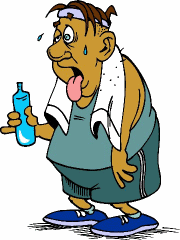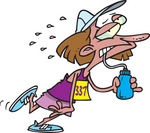FATIGUE, NUTRITION and FOOTBALL
Extracted from an article on theFA.com entitled Nutritional
Guidelines for Football Referees. The information
can equally apply to players. For the full article click here.
The Macronutrients
The Glycaemic
Index (GI)
Fluids
Fatigue is an
inevitable consequence of participating in any sport, and
training and correct nutritional practices can help to ensure that fatigue
occurs later rather than sooner. From a nutritional perspective, the following
are known to result in fatigue:-
1. Depletion of muscle glycogen stores – it has been known for at least 30 years that when muscle
glycogen stores become depleted the ability to engage in intense bouts of
exercise is not possible. This is because muscle glycogen is a fuel necessary
for muscles to work at intensities greater
than 50% of maximum. Fats on their own cannot be used as energy stores
for intense exercise bouts. It is imperative that referees have sufficient
muscle glycogen levels at the start of a match, and that they eat and/or drink
some carbohydrate during the match/training.
2. Low blood glucose (hypoglycaemia) – it has been known for at least 70 years that when blood glucose levels are low, the
ability to exercise is reduced. More recently, it has become clear that
maintenance of blood glucose is essential for the brain to function properly.
Since the role of refereeing
demands decision making skills, a reduced blood glucose level from low
liver glycogen content will invariably lead to slower times for reactions and
decisions. It is imperative that referees have sufficient liver glycogen levels
at the start of a match/training, and that they eat and/or drink some carbohydrate
during the match/training.
3. Dehydration – sweating is a normal
response in training and match play. The inevitable result is
that the body loses water and body temperature becomes elevated. Loss of body
water causes dehydration, and this leads to impaired physical and mental
performance. It is imperative that referees are well hydrated before a match,
and continue to drink fluids at opportunities during the match.
Carbohydrates
There are several
important functions about carbohydrates:-
1. Energy Source – Provides the energy for high intense activity. Energy comes from the breakdown of glucose from the
blood and glycogen in muscle.
2. Protein Sparing – Sufficient carbohydrate intake can help to stop muscle tissue protein breakdown. The main role of protein in the body is for maintenance, repair and growth of body tissue. When the carbohydrate levels in the body become depleted through prolonged exercise or insufficient carbohydrate in the diet, protein is used as a source of energy.

3. Fuel for the Brain – carbohydrate is essential for the proper functioning of the brain. Blood glucose is the only fuel used by
the brain. So when blood glucose levels are low (hypoglycaemia), the brain does
not work as well as it should. Decisions and skill are impaired, and fatigue
will happen.
Fats
Although the fat
intake of a referee should not be high, fats are needed in
the diet and have many essential functions in the body such as: -
1. Energy Source - Fats are the major
energy reserve in the body, and the major source of energy for low intensity
activity.
2. Protection and insulation -Fats act as
a protective shield against trauma to vital organs such as the heart, liver,
kidneys, spleen, brain and the spinal cord.
3. Cell membranes - Fats are a major
part of all cell membranes including nerves and brain cells.
4. Vitamin carrier, and fat and cholesterol transporter
- Fat serves as a carrier for the fat soluble vitamins – A, D,
E, and K. They also help in the transport of fats and cholesterol in the blood.
5. Hunger depression - Fats in the diet
delay the onset of ‘hunger pangs’ and contribute to feeling of fullness after a
meal. This is because fat empties from the stomach slowly.
Protein
Protein is an
essential macronutrient within the body and performs many important roles concerning structure and function. These
roles include: -
1. Structure - Building material for bone,
ligaments, tendons, and muscles are protein.
2. Enzymes - All enzymes are proteins. Enzymes
regulate many energy producing reactions, as well as the building and repair of tissues, especially
muscle.
3. Hormones - Hormones such as insulin and
adrenaline are proteins and are important in controlling exercise metabolism.
4. Blood Transport - Protein is required in the
body for the synthesis of the many blood transport proteins such as haemoglobin
and albumin.
5. Energy
- Proteins can
act as an energy source after the depletion of carbohydrate following
exercise.
Traditionally
carbohydrate-containing foods have been classified as simple or complex. In this instance, foods which are high in
simple carbohydrates include glucose, sugar, fruit, jams, sweets and
confectionery products, whereas complex carbohydrates include foods high in
starch, such as bread, pasta, potato, and rice. More recently, the glycaemic index (GI) has been used to categorise foods
according to their ability to raise blood glucose. Since all
carbohydrate-containing foods raise blood glucose levels following digestion
and absorption, the GI is a useful way of ranking composite and simple
carbohydrate sources based on this ability.
Selected foods categorised on their GI values.
Low GI foods Moderate GI foods High GI foods
Fructose 23 Sucrose 65 Glucose 100
All-Bran 42 Muesli 68 Cornflakes 84
Apple 36 Mango 55 Watermelon 72
Pear 36 Banana 53 Pineapple 66
Pasta 41 Rice 56 Bread 70
Chocolate 49 Popcorn 55 Jelly beans 80
Peanuts 14 Crisps 54 Corn chips 73
Apple juice 41
Yoghurt 33 Ice cream 61 Baked potato 83
When to use foods of varying GI?
1. The
pre-training/pre-match meal should be high in
carbohydrates with a low-GI IF referees are sensitive to small decreases in blood glucose in the
first 10-15 minutes.
2. Drinks with a
moderate to high-GI are of greatest benefit during training or
a match.
3. Drinks or food with
a high-GI are essential in the early stages of recovery from
training/match.
4. Drinks or food with
a high-GI should normally be avoided at night unless the
day before or the day of a game.
Prevention of dehydration
1. The loss of body fluids
from sweating causes fatigue, and so referees must take
on board enough fluids during games and training.
2. The rule of thumb
is ‘little and often’. Drinking around 200mls (a paper cup
full) every 15-20 minutes is recommended.
3. Drinking about 500
ml of fluid in the hour before a match/training is
required.
4. Drinking fluids
during half-time is also strongly advised.
5. Ideally referees
should drink 2 litres of water (I suggest Penta water) the day before a game.
What should the drink contain?
1. In hot conditions
just water should be ingested. This is because the
addition of carbohydrates tends to slow down the rate at which water gets into
the blood. The more concentrated the carbohydrate drink, the slower the rate of
delivery of water to the blood.
2. Drink a low
carbohydrate drink in the early stages (say 40-45 minutes), followed by a normal carbohydrate sports drink at
half-time and in the last 20 minutes.
Rehydration
1. Dehydration from
sweat loss is inevitable during strenuous exercise, whether
in the heat or not. This is because more fluids is lost through sweating than
can be taken by drinking i.e. sweat rates of 1.5-2 litres an hour are not![]() uncommon, whereas drinking more than 1 litre an hour is difficult to achieve.
uncommon, whereas drinking more than 1 litre an hour is difficult to achieve.
2. Referees must rehydrate adequately afterwards.
3. A useful guide to
see how much body fluid is lost in training or a match is to weigh yourself (nude
and dry) before and afterwards. The weight loss in kg is equal to water loss
from sweat in litres i.e. 0.5 kg loss = 500 mls
water lost.
4. Drink fluid after
training/match at least 150% (1.5 times) the body weight loss i.e. if 1 kg of body
weight is lost through sweat, drink 1.5 litres of fluid.
5. The drink must contain
sodium (normally in the form of salt). The recommendation is around 0.7-1.2 g
in a litre.
6. Carbohydrates
drinks do not make a difference to rehydration after exercise.
7. Food eaten with
water helps to rehydrate, because the food contains
water and salt.
8. Many of the ‘soft’
drinks (e.g. coke) contain no (or too little) salt, and are not useful for rehydration.
9. Drink as soon as
possible after exercise since body fluid recovery takes at
least 30 minutes. However because drinking fluids inevitably leads to urine
production and elimination, actual rehydration may
not be complete for 4-6
hours.
Penta Water
There is evidence that
Penta water may help rehydrate
players more quickly than other bottled water, and that Penta also helps hydrate more effectively when drunk before
and during training/games.
